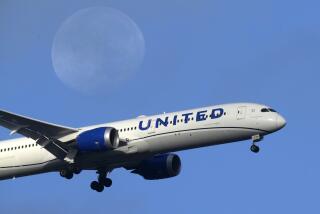Executive Travel : Hilton Ups the Ante in Frequent-Stay War
- Share via
In a bid to win market share from competing chains, Hilton Hotels Corp. last week upped the ante for hotel frequent-stay programs by announcing that its guests can exchange their room points for miles on participating airlines, or vice versa.
Hilton’s move is the latest in a series this year by hotel chains reconfiguring their frequent-stay plans. While most other chains have restricted their programs, awarding fewer points for room stays, Hilton has bucked the trend by continuing to allow “double dipping,” awarding both miles and points for room stays.
Hotel frequent-stay programs, which are modeled after airline frequent-flier programs, are aimed at business travelers to develop brand loyalty. Because the programs are expensive to maintain, however, some business-class hotel chains have been quietly scaling them back in the past year.
“With this, Hilton has positioned (itself) to continue to be quite aggressive,” said Randy Petersen, who monitors and ranks frequent-flier and frequent-guest programs for his Colorado-based publication “Inside Flyer.”
*
Indeed, Hilton’s double-dipping strategy generated a 30% increase in members during 1993 and an additional 15% growth in new members this year, said Jeff Diskin, Hilton vice president of marketing.
Other hotel chains, in contrast, have stopped allowing double dipping.
Hyatt Hotels, for example, eliminated double dipping earlier this year in favor of short-term mileage promotions, said Hyatt spokeswoman Carrie Reckert in Chicago. Guests now earn Hyatt Gold Passport mileage points they can redeem for either hotel stays or plane tickets, but not both. Short-term promotions can still help frequent guests rack up points quickly, however.
“We did some research to find out what our customers wanted, and this was one of the options,” she said. “The promotions are short-term, but they’re very generous.”
Indeed, a recent “Nights after Nights” promotion attracted about 150,000 new members between April 15 and Aug. 31, Reckert said.
Boston-based ITT Sheraton also eliminated double dipping earlier this year. The company is betting that its international net of participating properties will be enough to keep its frequent guests from defecting to other programs. Guests can redeem their Sheraton Club International award points at more than 400 properties in 50 countries, said Lisa Dickason, spokeswoman for Sheraton in Boston. “It’s the most global of all the programs.”
In addition, Sheraton gives its most frequent guests--those who earn VIP Gold Club status--a 50% bonus on points earned.
Marriott Hotels of Washington, which has the oldest and largest of all the guest award programs, has also introduced a separate mileage program in the last year. But guests must choose whether they want to earn mileage points or room points. They can’t earn both.
Because it has been around since 1983, the Marriott Honored Guest Award Program has a large, loyal following, said Marriott spokeswoman Catharine Boire. “We’ve never had to double-dip.”
It’s the ability to not just earn both types of awards, but to interchange the two that sets the Hilton program apart, Petersen said.
Using this program “is like going back to the early days (of reward programs) when it was possible to earn a totally free vacation,” he said.
In most hotel reward programs, guests can choose to earn either points toward room stays or miles for airline tickets, not both. And once they’ve chosen, they can’t change their minds later and convert the room points into mileage points or vice versa.
*
That limits the value of the points. In a program such as Hilton’s, where the two types of points are interchangeable, business travelers can use their awards to their advantage. If they are close to earning a free airline ticket, for example, they can use some room points to reach the award level. Or if they are nearing the point level for free room stays, they can convert some mileage points over.
The flexibility is valuable because travelers are less likely to need an additional trip to reach an award level.
To convert miles to points, members of the Hilton HHonors program contact the partner airline, just as they would to redeem any type of award. Airlines participating in the program so far include Alaska, America West (in 1995), Delta and United. Guests must convert a minimum of 5,000 miles, which translate into 10,000 hotel points.
Conversely, to convert their hotel points to miles, HHonors members call Hilton, which contacts the airline. To use this option, members must convert a minimum of 10,000 points, which translate into 1,500 miles.
The disparity in the exchange rates reflects the differing costs of airline miles compared to hotel stays, said Hilton spokesman Marty Gordon. It is also designed to discourage people from shifting miles on one airline to miles on another by converting them to Hilton points first.
There is one scenario in which shifting miles to airline points and back to miles can be a benefit, Petersen said. For example, if you have frequent-flier miles that are about to expire, you can convert them to room points, then convert them back to frequent-flier miles when you need them.
Although you pay a price for the swap because you don’t get back the same number of miles you gave up to get room points, it is better than letting your miles expire, Petersen said.
More to Read
Sign up for The Wild
We’ll help you find the best places to hike, bike and run, as well as the perfect silent spots for meditation and yoga.
You may occasionally receive promotional content from the Los Angeles Times.






